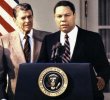In all fairness, I haven't fully reviewed her voting record either, but from what I know of it...this, she is not.
I decided to take your advice and look up Hilary's voting record. I used the website VoteSmart.org, and if this is not a reputable website, please let me know.
I compared Clinton to Colorado's conservative Senator, Wayne Allard. He is pretty far into the right's camp, so I thought he might be a good choice.
It was interesting to match the two. You are right, Hilary voted for more spending provisions, including the emergency funding bills. She didn't vote for the tax cuts or to make them permanent.
One other note, Hilary voted for VA monies, where Allard did not.
Hilary:
http://www.vote-smart.org/voting_category.php?can_id=WNY99268
Wayne Allard
http://votesmart.org/voting_category.php?can_id=H0632103
I consider myself a moderate and slightly right due to the need for fiscal restraint, keeping most decisions at the local and State level, gun control, military, and other issues. Fiscally, I don't mind paying taxes as long as the money is spent in a responsible way to provide services, in which I have some benefit. To me, cutting taxes is not a positive thing if we have lots of bills and deficit spending. I would rather have a stable balanced budget that limits spending, reduces the deficit, and then provides a tax refund fo rmonies not spent (sort of like USAA does).
Anyway, I apologize for getting onto a tangent. Based on Hilary's record, she seems to have voted yes on all of the requested emergency funding for the war, voted for veterans, as well as funding for other social programs.

 aperbag_
aperbag_




